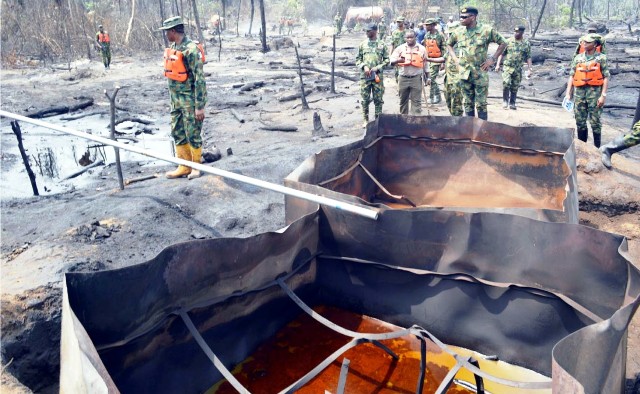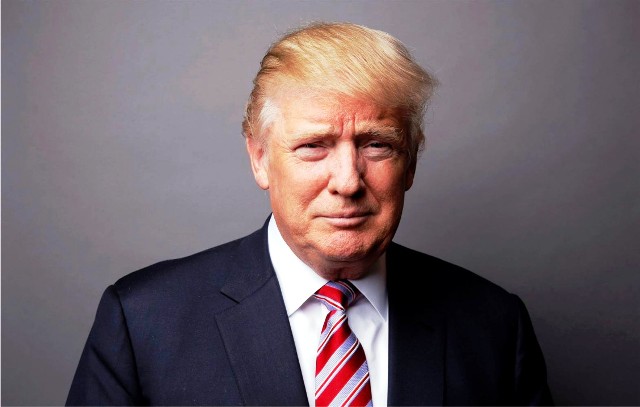Editorial
That FG’s Revelation On Illegal Refineries

While the Rivers State Governor, Chief Nyesom Wike, declares war on operators of illegal refineries whose activities have originated soot in some parts of the state, the Federal Government has complimented his bravery and hardiness in frontally tackling the flagellum and exhorted other governors in the South-South region to emulate him.
Speaking on Arise TV, Special Assistant to President Muhammadu Buhari on Niger Delta Affairs, Senator Ita Enang, urged all governors in the region to take similar steps to extinguish soot emissions from atmospheric pollution. He said governors from the affected states should rise to the occasion and deal with the situation as it was not within the purview of the Federal Government to do so.
Ostensibly shifting the responsibility for the control of the soot ravaging parts of the Niger Delta region from the federal to state governments, Enang, who was also a former Senior Special Assistant to Buhari on National Assembly Matters, said that since the states controlled lands in their localities, they should deal with the problem.
Giving kudos to the Rivers State governor on the way he had managed the soot threat in the state so far, the Distinguished Senator, however, speedily added that what was occurring was fundamentally ‘re-pollution’ as the illegal refiners would simply relocate to distant areas to carry out their nefarious activities. Hear him,
“I will commend the Rivers State Governor Nyesom Wike on the way he has handled the soot crisis in the state so far. But what he has done is what I will call re-pollution of the environment because the so-called illegal refineries will simply move to other locations and the problem will continue.
“Those who are into these illegal refineries are not just mere illiterates or uneducated artisans you find on the streets. Many of them are highly educated. These are people who are well-trained in petroleum refining engineering and technology. They are well-educated in petroleum technology and pipeline technology, so they would always put their knowledge to use.
“Yes, Wike has taken a decision and other governors must take decisions on these illegal refineries. The problem is in Delta State, it is in Akwa Ibom State, it is in Bayelsa State. And the governors of these states are the ones who must tackle the problem and not the President Muhammadu Buhari-led administration because the governors are in charge of lands in their states.”
The Federal Government’s recognition of Governor Wike’s continued efforts to halt the soot devastating Rivers’ residents for more than five years is laudable. However, it is stunning to see that the same federal authorities have shied away from the problem arising from a significant federal resource on the Exclusive List.
The question is, when did state governments become exclusively responsible for going after crude oil thieves and illegal refiners who ordinarily are offenders of federal law? If state governors have to end illegal refining of crude oil in their domains as expected, it is only logical to conclude that they should be in charge of the mineral resources therein. This highlights the country’s institutional inadequacy and weakness.
Enang’s revelation of the identities of the criminals, whom he referred to as graduates of petroleum refining engineering and technology from the famous Petroleum Training Institute (PTI) is indeed shocking and insensitive. It simply means that all the time, the Federal Government knows the felons but deliberately chose to look the other way. No wonder they kept ignoring calls by the Rivers State Government to be involved in the fight against crude burglars.
Oil theft in Nigeria is aided by a variety of factors. Weak infrastructure, such as old pipelines, without a doubt, enables thieves to access crude oil. In addition, general under-investment in the sector and poor safety of the country’s waterways trammel efforts to combat the crime. These obligations, of course, are a matter for the Federal Government, not the state.
By not acting at the time that mattered most, the Buhari’s government only demonstrated a dominant culture of poor governance in the downstream oil sector of the country. Amid high unemployment at 33.3 per cent, poverty, and insecurity, it is scandalous that there are no all-out measures to protect the country’s major export and revenue resource (crude oil) or punish crime and adopt reforms to maximise benefits from the item.
There is a huge niche market propelling the activities of illegal refinery operators, suggesting that both the state and the federal authorities must engage them to avoid unnecessary pollution of the environment and economic loss.
Also, the report of the National Summit on the Integration of Artisanal/Modular Refinery Operations into the In-Country Oil Refining Programme of the Oil and Gas Sector has to be implemented. These were part of the resolutions reached at the end of the emergency stakeholders’ meeting convened by the Presidency in Abuja to address the soot and other environmental pollution caused by artisanal refining activities in Rivers State and other Niger Delta states.
Editorial
New Federal Varsity In Ogoni

President Bola Ahmed Tinubu has made history by signing into law a bill that establishes the Federal Univer-
sity of Environment and Technology in Ogoni, Rivers State. This significant occasion marks a bold step forward not only for the Ogoni people but also for the Niger Delta region and Nigeria as a whole. It signifies a commitment to education, environmental sustainability, and technological advancement.
For the Ogonis, who have long been impacted by environmental challenges, the university represents a beacon of hope. It is more than just bricks and mortar; it is a symbol of empowerment and a pathway to a brighter future. This development is akin to a seed, planted with the promise of a flourishing harvest of skilled professionals.
The university’s emphasis on environmental technology is extremely important, especially given Nigeria’s climate crisis. Education plays a crucial role in developing sustainable solutions. The institution will provide students with the necessary skills and knowledge to address the environmental challenges affecting the Niger Delta region and beyond. This will have a momentous impact.
Signing the bill, the President praised the Ogoni people’s resilience and unity. He stressed that the institution would mark a “significant milestone in our national journey towards environment justice, education and sustainable development”. Tinubu said the university is a reaffirmation of his administration’s “unwavering commitment to the people of Ogoni, the Niger Delta and the nation as a whole. For decades, the Ogoni people have been at the forefront of fight for environmental restoration and sustainable development, shaping both national and global conversation of these critical issues.
“By signing this bill into law, we are taking a decisive step towards addressing historical grievances and creating new opportunities for learning, growth and prosperity. The university will serve as a centre of excellence, equipping young Nigerians with the knowledge and skill to tackle present environmental challenges, drive clean energy solutions and contribute to our national sustainable economic development.”
We commend President Tinubu for his visionary decision to establish the much-needed institution aimed at fostering development and progress. This initiative is a testament to his commitment to addressing critical social and economic knots and creating opportunities that will benefit the people. The President has laid a solid foundation for sustainable growth while demonstrating a genuine desire to empower and advance the nation’s collective interests.
In addition to his commendable action, we applaud Tinubu for initiating peace talks to bring stability and reconciliation to the troubled area. The decision to engage in constructive dialogue demonstrates a deep understanding of the relevance of inclusive governance and the role of peace in fostering meaningful development. For decades, Ogoni has endured turmoil and neglect, impeding its potential and the return of oil exploration activities.
By opening the door to peaceful negotiations, the President has made a bold and necessary move towards healing fractured relationships and fostering trust among stakeholders. This initiative holds the promise of ensuring that the voices and needs of the Ogonis are heard and respected. We urge all parties involved to seize this golden opportunity for lasting peace and progress. It is only through unity and mutual respect that the full potential of Ogoni, and by extension the nation, can be realised.
As steps are taken to acknowledge and remediate the damage caused by years of oil exploration and production, the Ogonis must reciprocate Mr. President’s gesture by fostering a climate of equanimity and stability. This will ultimately pave the way for the resumption of oil exploration and production. This is not a call to forget the past, but a pragmatic recognition that meaningful change and sustainable development require a collaborative approach.
The Federal Government has a responsibility to ensure that all academic disciplines offered by the new university are fully accredited to maintain the integrity and quality of the school. Without proper accreditation, the institution risks producing graduates who are ill-equipped to compete in the global workforce or contribute substantially to national development. Accreditation serves as a benchmark that ensures programmes meet academic standards and adhere to best practices across various fields of study.
Staff recruitment should be conducted carefully, as the individuals brought into a team can greatly influence an organisation’s performance, culture, and long-term success. The primary focus of recruitment efforts at the university should be on attracting the best candidates who possess the necessary skills, qualifications, experience, and values. Merit should be the guiding principle in decision-making throughout the hiring process, rather than favouritism or personal bias.
For a nation to thrive in the 21st century, a strong higher education system is not only desirable, but essential. Universities serve as the catalysts for innovation, the breeding grounds for future leaders, and the foundations of a knowledge-based economy. The Federal Government must acknowledge this vital role and take intentional actions to properly fund the university in Ogoni and develop infrastructure to ensure it meets international standards. Neglecting this responsibility would put its future prosperity and global competitiveness at risk.
This institution must not suffer the same fate as other federally-owned universities that have been left to decay. That will be a disservice to its purpose and potential. Many government-owned universities in the country have struggled with dilapidated infrastructure, underfunding, insufficient staffing, and interruptions caused by industrial actions due to unpaid wages or poor working conditions. These challenges have led to declining standards in education, putting both students and staff at a disadvantage. The Ogoni University must not be another victim of this worrying trend.
Editorial
HIV, Transiting From Donor Dependence

The initial announcement by United States President, Donald Trump, to cut funding for international
HIV/AIDS initiatives sent shockwaves through the global health community. In Nigeria, a country facing a significant HIV/AIDS burden, the potential consequences were dire. However, the subsequent waiver granted by the administration has provided a lifeline for the millions of Nigerians who rely on the President’s Emergency Plan for AIDS Relief (PEPFAR) for their treatment and support.
PEPFAR has been an important partner in Nigeria’s fight against HIV/AIDS. Since its inception in 2003, PEPFAR has committed more than $7.8 billion to the country, catering to approximately 90 per cent of HIV treatment requirements. With this funding, Nigeria has been able to enhance its HIV prevention, treatment and support services and has witnessed a reduction in HIV/AIDS deaths.
The waiver granted by the Trump administration guarantees that PEPFAR’s life-saving medicines and medical services will continue to reach the needy. Antiretrovirals (ARVs) are the most common type of medicine used to treat HIV and reduce the virus’ spread. Through the provision of ARVs, PEPFAR helps prevent the spread of HIV and enhances the quality of life of those with the condition.
Although Nigeria was recently exempted from the requirement, the signs are evident: the country has to graduate from dependence on donor funds for its HIV/AIDS control programmes. Over the years, partners including the U.S. government have been central to the provision of treatment to people living with the virus. However, it is time for Nigeria to own its national response to HIV/AIDS.
Nigeria’s HIV/AIDS burden remains critical, accounting for 10 per cent of the global total. In 2023 alone, there were 75,000 new infections and 45,000 HIV-related deaths. The battle against Mother-to-Child Transmission remains challenging, with only 35 per cent of the target 75 per cent being met. Nearly 1.7 million Nigerian children have been orphaned due to HIV. Vulnerable populations, especially women and children, continue to disproportionately suffer.
To transition away from donor dependence, a multifaceted approach is necessary. Firstly, the country must increase its domestic financing for HIV/AIDS programmes. This can be accomplished through innovative funding mechanisms, such as leveraging public-private partnerships and exploring local revenue sources. Secondly, the government needs to strengthen its healthcare system to ensure equitable access to testing, treatment, and care. This involves expanding access to antiretroviral drugs, investing in community-based models, and addressing the stigma associated with HIV.
Thirdly, Nigeria must prioritise prevention efforts. This entails promoting condom use, providing comprehensive sexual education, and increasing awareness about the risks and modes of transmission. By focusing on prevention, the country can decrease the incidence of HIV infections and ultimately lessen the burden on its healthcare system.
Finally, Nigeria should develop a sustainable human resource strategy for its HIV/AIDS response. This involves training and equipping healthcare workers, engaging community volunteers, and empowering people living with HIV to advocate for their rights. A well-trained workforce is essential for delivering high-quality services and ensuring the long-term success of the response.
The transition beyond donor dependence is a complex but necessary journey for the country. By increasing domestic financing, strengthening healthcare systems, prioritising prevention, and investing in its human resources, the country can create a sustainable and effective response to HIV/AIDS. Also, the government should consider alternative funding mechanisms, such as increased domestic funding, public-private partnerships, and philanthropic initiatives. The time to act is now, for the well-being of present and future generations.
Nigeria’s National Agency for the Control of AIDS (NACA) has made momentous strides in combating HIV/AIDS, including expanding access to testing, treatment, and education. However, challenges persist, hindering the effectiveness of these efforts.
One major obstacle is limited access to healthcare facilities, particularly in rural areas. This impedes timely diagnosis and treatment, reducing the likelihood of optimal outcomes for those living with HIV. Additionally, stigma surrounding the disease remains a formidable barrier, preventing individuals from seeking testing and care. Inadequate awareness campaigns further contribute to low testing rates and delayed diagnosis.
Addressing these challenges requires concerted action by the government and stakeholders. Allocation of adequate funding is crucial to expand healthcare infrastructure and ensure the availability of essential services. Moreover, targeted interventions to reduce stigma and promote awareness are vital for increasing testing and early detection.
Collaboration between civil society organisations and grassroots movements is also essential for advocating for protection of HIV funding. Advocacy campaigns can mobilise public support and pressure lawmakers to prioritise the fight against HIV/AIDS. By addressing these challenges and ensuring sustainable funding, Nigeria can depend less on donor countries, drastically reduce HIV transmission, and provide the necessary care to those affected by the disease.
Editorial
Israel-Gaza War: Sustaining The Ceasefire

-
Rivers4 days ago
Registration Opens For 2025 ECL Quiz Competition In Rivers
-

 Sports1 day ago
Sports1 day agoS’Eagles Coach Visits Iwobi, Others Ahead W’Cup Qualifiers
-

 News1 day ago
News1 day agoPolice Arrest Murder Suspect, Foil Robbery In Lagos
-

 Niger Delta1 day ago
Niger Delta1 day agoRe-Elected JONAPWD Chair Pledges Push For Disability Commission
-
News4 days ago
Monarch Asks Speculators To Avoid Minama Settlements
-
Sports4 days ago
4000 International athletes to Attend Lagos City Marathon
-

 News1 day ago
News1 day agoEtche Agog As Opurum Crowns New King
-

 News1 day ago
News1 day agoStop False Admission Denial Claims, JAMB Tells Parents

